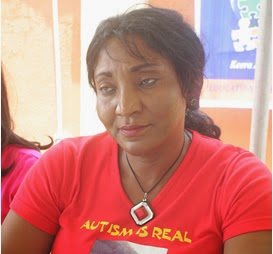Rubella epidemic during pregnancy increase risk of autism – Mbakwe
By Chioma Umeha
By Chioma Umeha
Mrs. Helen Mbakwe, is the President, Keera Autism Foundation, (KAF) in Lagos. In this interview with CHIOMA UMEHA (HEALTH EDITOR) Mbakwe, also a lawyer, who has a daughter living with autism, x-rays challenges of parents and children with the condition. Excerpts:
 |
| Mrs. Helen Mbakwe, is the President, Keera Autism Foundation, (KAF) in Lagos. |
Give the overview of autism?
Autism is a developmental disorder of the brain. It affects children that are less than three years. It is characterised by a problem with social interaction, impairment in verbal and nonverbal communication and a pattern of repetitive behaviour with narrow, restricted interests. Autism is classified as one of a group of disorders known as the pervasive development disorders (PDD) by the American Psychiatric Association. In addition, PDD include Asperger syndrome, which is a childhood disintegrative disorder. This group of disorders is sometimes called the autism spectrum disorders (ASDs). Autism goes without diagnosis until the child enters school. Autism is highly genetic and genetics of autism is complex and unclear about the genes responsible for this disorder. Observable signs can be seen within the first two years of life. Early intervention can help the child regain skills, social behaviour and self-care as there is no cure to this illness.
Mention factors that can put children at risk of autism?
Studies suggest that the prevalence of autism is one to two per 1000 globally. The number of reported cases of autism increased dramatically in the 1990s and early 2000s. This rise is contributed by factors like changes in diagnostic practices, referral patterns, availability of services, age at diagnosis and public awareness. Autism is associated with several other conditions like genetic disorders, mental retardation, epilepsy and metabolic defects.Various factors contribute to the causes of autism. Some of them are exposing to infections especially in the rubella epidemic during pregnancy increase the risk of autism in new born among others. A review conducted in 2007 showed that advanced maternal and paternal age, prenatal, perinatal and postnatal infections, exposure to toxic agents, obstetric conditions like low birth weight, decreased gestation period and hypoxia during child birth are the risk factors of autism.
List signs and symptoms of autism?
Children with autism may show normal development for the first few months or years. Later they become less responsive. Signs and symptoms widely vary in children. Diagnosis is based on the behaviour; signs and symptoms. After initial identification, specialists like a child psychologist or a developmental pediatrician do assessments. They use a variety of methods like a standardardized rating scale to identify the disorder.
Discuss treatment and prevention of autism?
There is no cure for autism. Proper treatment and education can help the child to learn and develop. Treatment depends on the condition and individual needs of the patient. Combination of treatment methods is more effective as autism requires lifelong treatment. Autism can be prevented by avoiding alcoholic beverages and drugs during pregnancy. It can also be prevented through immunization against rubella.
Discuss challenges of parents with children living with autism?
It is very difficult to raise a child with autism. The parents experience a lot of stress to meet the demands of the child. Recognizing the problem and preparing one’s self to face the challenges ahead would be helpful and make a tremendous difference. The severity of symptoms varies greatly, but all people with autism have some core symptoms in the areas of: Social interactions and relationships. Symptoms may include: significant problems developing nonverbal communication skills, such as eye-to-eye gazing, facial expressions, and body posture; failure to establish friendships with children the same age and lack of interest in sharing enjoyment, interests, or achievements with other people. The next is lack of empathy. People with autism may have difficulty understanding another person’s feelings, for instance; pain or sorrow. Another challenge is verbal and nonverbal communication. The symptoms include: delay in, or lack of, learning to talk. About 40 per cent of people with autism don’t speak, while some find it difficult to start a conversation. Also, people with autism have difficulties continuing a conversation after it has begun. They also have problem of stereotyped and repetitive use of language. People with autism often repeat over and over a phrase they have heard previously. They also have difficulty understanding their listener’s perspective. For example, a person with autism may not understand that someone is using humour. They may interpret the communication word for word and fail to catch the implied meaning. Children with autism show limited interests in activities or play. Symptoms may include: an unusual focus on pieces. Younger children with autism often focus on parts of toys, such as the wheels on a car, rather than playing with the entire toy. They are often reoccupied with certain topics. For example, older children and adults may be fascinated by video games, trading cards, or license plates. They show stereotyped behaviours. These may include body rocking and hand flapping. Symptoms of autism are usually noticed first by parents and guardians during the child’s first three years. Although autism is present at birth (congenital), signs of the disorder can be difficult to identify or diagnose during infancy. Parents often become concerned when their toddler does not like to be held; does not seem interested in playing certain games and does not begin to talk. They also may be confused about their child’s hearing abilities. Some children with autism do not hear, sometimes, he may appear to hear a distant background noise, such as the whistle of a train. With early and intensive treatment, most children improve their ability to relate to others, communicate, and help themselves as they grow older. Contrary to popular myths about children with autism, very few are completely socially isolated or “live in a world of their own.” During their teenage years, the patterns of behaviour often change. Many teens gain skills but still lag behind in their ability to relate to and understand others. Puberty and emerging sexuality may be more difficult for teenagers who have autism than for others this age. Teens are at an increased risk for developing problems related to depression, anxiety, and epilepsy.
Explain your passion for children living with autism and why you set up a foundation?
KAF was set up as a result of my family’s personal experience and the desire to help others with the same problem. I have a daughter, Keera, living with autism. Keera, my daughter is a 13 and has two brothers. After birth, her life was just like that of millions of Nigerian children and fun, until six months before her third birthday when she was diagnosed with autism. Since then, her learning and communication issues, coupled with difficulties in socializing and repetitive behaviour have made life a roller coaster of sorts. The burden has not been Keera’s alone to bear, as my family constantly sought medical, spiritual and educational solutions. Like my family and Keera, there are countless families out there in need of direction, wholesome solutions and comfort. The condition of my daughter exposed me to the problems of parents with children living with autism. That was why I set up Keera Autism Foundation (KAF). KAF was set up in honour of Keera. The Keera Autism Foundation, KAF is a not-for-profit organisation set up to provide succour for both children living with the condition and their families. Recently, KAF commenced a campaign to help empower and support children living with autism, their parents and care-givers. The main focus of the campaign for children living with autism is provision of information on the condition, with the aim of making more Nigerians understand and appreciate the stress which children living with the condition faces with their families. In most cases, children living with autism and their families are victims of a poorly understood condition.
What is the scope of your campaign?
KAF is embarking on a journey that will enlighten the populace on certain unknown facts and correct many assumptions. It will open up new vistas through which an average Nigerian will understand the challenges associated with autism. The awareness campaign, which will run in phases throughout the year, will make use of the electronic, print, outdoor and social media. Strategic parts of the campaign include educational series in newspapers; docu-drama and Documentary on Television; radio drama; news and features write-ups in the print media. Nigerians love for the Social Media will also be exploited to pass the message along to the public.Our goal is to provide relief for affected children and families while creating an enabling social environment in communities through advocacy and awareness. In line with this belief, the foundation will offer specialized education and care for children living with autism. This includes recreational facilities and supervised play and graded skill acquisition for the children; integration of the children into society and advocacy for employment for adults with autism. KAF also provides relief for parents of children living with autism through guidance on family and social structures for autism and opportunities for interfacing with international and local medical and educational experts versed in autism. Our aim reflects in our slogan: ‘Education, Awareness, Support, Integration, Empowerment, Relief’ which translates to the “EASIER” life we will provide to people living with autism and their families.
What are symptoms of autism during adulthood?
Some adults with autism are able to work and live on their own. The degree to which an adult with autism can lead an independent life is related to intelligence and ability to communicate. At least 33 per cent are able to achieve at least partial independence. Some adults with autism need a lot of assistance, especially those with low intelligence who are unable to speak. Part- or full-time supervision can be provided by residential treatment programs. At the other end of the spectrum, adults with high-functioning autism are often successful in their professions and able to live independently, although they typically continue to have some difficulties relating to other people. These individuals usually have average to above-average intelligence. Many people with autism have symptoms similar to attention deficit hyperactivity disorder (ADHD). But these symptoms, especially problems with social relationships, are more severe for people with autism. About 10 per cent of people with autism have some form of special skills and gifts such as memorizing lists, calculating calendar dates, drawing or musical ability. Sleep problems occur in about 40 per cent to 70 per cent of people with autism.
How early diagnosis and treatment can help children with autism?
Early diagnosis and treatment helps children with autism develop to their full potential. The primary goal of treatment is to improve the overall ability of the child to function. Symptoms and behaviours of autism can combine in many ways and vary in severity. Also, individual symptoms and behaviours often change over time. For these reasons, treatment strategies are tailored to individual needs and available family resources. But in general children with autism respond best to highly structured and specialized treatment. This includes programmes which focus on helping parents improve communication, social, behavioural, adaptive, and learning aspects of their child’s life. The American Academy of Pediatrics (AAP) recommends the following strategies for helping a child to improve overall function and reach his or her potential.
This story was published in Newswatch Times on June 6, 2013.



Comments
Post a Comment